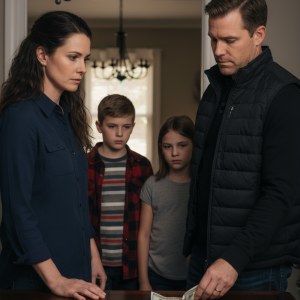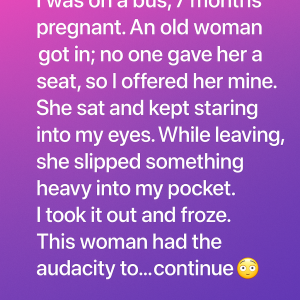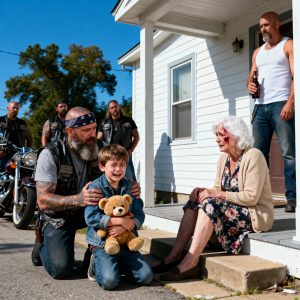The keys were still warm in my hand as I pushed open the front door, grocery bags digging red lines into my palms.
The late-afternoon light streamed softly through the curtains — the kind of warm glow that used to feel comforting. Not today.
In my leather recliner — the one Martha gave me before cancer took her — sat Harry. My son-in-law. Bare feet on the footrest, half-empty beer in hand, TV blaring basketball. The remote rested on his stomach like he owned the place.
“Old man,” he muttered without looking up, “grab me another beer from the fridge. Corona — not that cheap stuff you drink.”
I set the groceries down slowly. “Excuse me?”
“You heard me,” he said, eyes still on the game. “I’m comfortable.”
“This is my home,” I replied, voice steady.
He stood, looming over me. “Funny. Your daughter and I pay the bills — with my money. You want peace here? Do as I say. Simple.”
The kitchen door swung open. Tiffany walked in, taking in the scene — Harry’s stance, my expression.
“Your dad’s being difficult,” Harry said to her, still looking at me. “I asked for a beer, and he’s making it a big deal.”
“Dad, just get him the beer,” Tiffany said with a sigh. “It’s not worth fighting.”
Then Harry added, “Clark, you live in our house now. When I ask, you listen. No attitude.”
Tiffany’s voice was firm: “Dad, decide now. Do what my husband says — or leave.”
I looked at my daughter — searching for the little girl who once clung to me during thunderstorms. But all I saw was Harry’s arrogance mirrored in her face.
“Fine,” I said quietly. Harry smirked, thinking I’d given in.
“I’ll pack,” I added.
The smirk fell. Tiffany gasped. They thought I’d fetch the beer like some beaten dog. Instead, I walked to my room and pulled down the same suitcase I’d taken on my honeymoon to Yellowstone with Martha. Three changes of clothes, socks, underwear, and Martha’s photo wrapped in tissue. That was all I needed.
The Pine Lodge Motel was small but clean. I sat on the bed, the silence pressing in — not lonely, just unfamiliar.
The next morning, I made calls. Bank — mortgage payment stopped. Insurance — their cars off my policy. Credit cards — Tiffany removed as an authorized user. Every automatic transfer, every quiet subsidy I’d been making for years… gone.
By noon, my finances were mine again. My phone stayed silent. They didn’t know yet. But they would.
By Friday, I had twenty-two missed calls. The voicemails told the story in order: confusion, irritation, panic.
Tiffany: “Dad, the bank says payment stopped — we’ll lose the house!”
Harry: “Clark, fix this! You’re making us look bad.”
By midweek: “Dad… please, we can’t cover it. Just come back.”
I deleted each one.
A week later, they showed up at the motel. Tiffany’s eyes were red; Harry’s face was tight.
“You’re ruining our lives over a stupid beer,” Harry snapped.
“You gave me a choice,” I said calmly. “I made it.”
“Dad, please,” Tiffany whispered. “We can work this out.”
“I took care of you for five years,” I told her. “When I needed you to have my back, you chose him.”
Later that week, an old co-worker told me something chilling: Harry had tried to take out a $50,000 loan against my house — forged paperwork and all. Gambling debts.
The disrespect wasn’t random. It was calculated.
The next day, I filed eviction papers. Thirty days. The house would be mine again — legally and literally.
Harry retaliated with lies — telling neighbors I’d abandoned a “pregnant” daughter. Tiffany used the story too, until I asked for the doctor’s name. She refused to give it.
By then, the mask had slipped. I made her one offer: tell the truth, publicly. Admit what I’d done for her, and what she and Harry had done to me.
Sunday, she stood before the church: “My father paid my tuition, my wedding, our down payment, our mortgage. Three weeks ago, we told him to serve my husband or leave. I chose wrong.” Her voice cracked. “I want to start making it right.”
After the service, she told me Harry was gone. She’d filed for divorce.
Three months later, veterans moved into the house I’d reclaimed. I sat on the porch of my lakeside cabin when a text came:
“Dad, counseling’s helping. Can we have coffee? I want to earn your trust.”
I replied: “Saturday, at the diner.”
The lake glowed gold in the sunset. Justice done, dignity intact — and maybe, just maybe, a daughter ready to rebuild.





